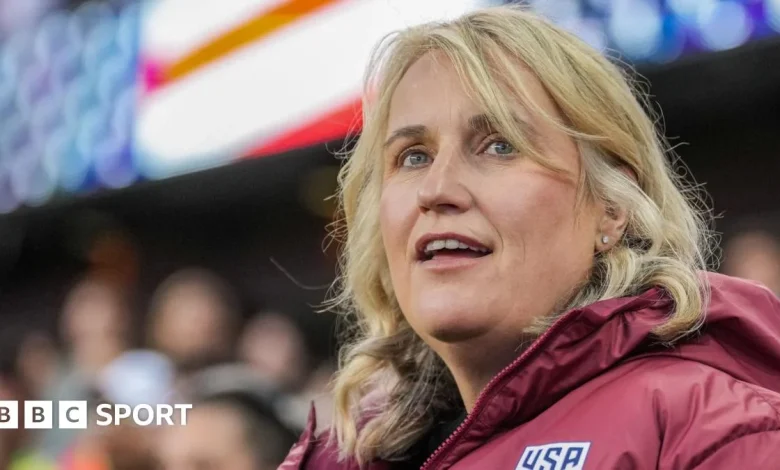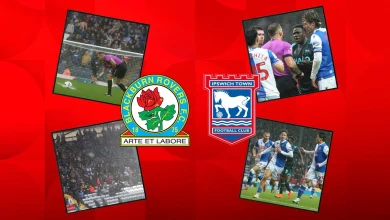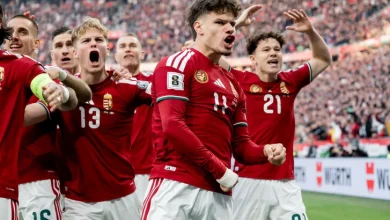Emma Hayes on role models, life as US boss and balancing football & family

Kelly: How did you find your way into this incredible career then?
Emma: I think a couple of things. My PE teacher always insisted I did leadership courses. Even when I was 16, I wanted to go into a career in diplomacy or something like that but I think probably the university years I did the role of coach – even though I didn’t choose it – and then when I left it and I came back to work in Camden for Camden sports development I started really coaching in the community and a few of us had developed or built the Regents Park League.
Then I moved to America. More than anything else, I just wanted to move to America. I didn’t necessarily want to be a coach but I knew that got me a visa to get into the country and live in New York City.
Kelly: Who would you say has had the biggest impact on your career?
Emma: It has to be my parents. Dad saw something for me that I couldn’t see. He was the biggest feminist I’ve ever met – as a working-class man. He had three daughters, so one of us had to be into football in a big way. But him, because he pushed me and sometimes I hated it. I was telling Harry the other day when he was playing football… I was stood on the touchline in silence. He said: ‘Mummy, why don’t you say something to me?’ I said: ‘Because I hated it when my dad did it to me, so I don’t want to do it to you.’ And he was really vocal that he actually wanted me to say a little bit more, and I was like: ‘OK.’
Kelly: So let me get this right… one of the best coaches in the world, goes to her son’s football and you keep quiet…
Emma: I stand on my own and I stay silent.
Kelly: Do you say much to him afterwards?
Emma: Just around joy. Like, they played a game the other day… they lost 10-2. Inside, I was dying. And I got in the car and I was like: ‘What did you enjoy about it today?’ And he said: ‘Oh, I love playing out wide.’ I want him to keep that love for as long as possible.
Kelly: You mentioned both parents having such a big impact… your mum as well…
Emma: Mum just encouraged me to do whatever I wanted. She just supported us to go and do it. If I’d say to her, ‘Mum, I want to go and work for the UN.’ … ‘Oh, you go and do that, love, if you want to.’ It was almost like I was given permission to explore and experiment. Being a mum now, I really appreciate her in a million ways. She was such a big part of my life then, but I think she’s an even bigger part of my life now since my dad has passed. At this stage of life, I really feel like I really need my mum in a different way. That’s why, for me, they’re my biggest heroes. She helps me so much, especially with the menopause. Like if I’m having anxiety or things that I know I’m struggling with, she’ll say: ‘Just get the paper bag out, take a breath and calm your mind.’
Kelly: It feels different when your mum says it, doesn’t it?
Emma: I never suffered with anxiety until I had the menopause. What I’ve learned is that when you lose oestrogen in your body, especially when you have sudden menopause, like I had – I didn’t have a gradual menopause, I had a sudden one. I had emergency surgery and when you lose both your ovaries… oestrogen is not just a lubricant in your body for your joints, but also for your brain – what starts to happen is your brain starts going, ‘hello, oestrogen, where are you?’ And it can’t find it. Then you have a decrease in dopamine and serotonin. So your body struggles and has a lot of inability to be able to do it naturally, so your anxiety levels go up. That for me was exacerbated when I had Harry, but it intensified once I had the sudden menopause.
Kelly: You’re a football coach. Why is it so important to you to talk about things like that?
Emma: I think as a woman, we have to live our life in football through an entirely male lens and we’re different. We think differently, we have different needs, we experience the game differently.
The thing I love most about being in America is they value female sports. I feel like I’ve had to speak up about it. I did a conference the other day and they were asking about my earliest experiences with biases and they’ve been shaped from such a young age. Whether it’s going on coaching courses where you were the only female, to referees coming over and going straight to your male assistant and thinking they’re the head coach. If you spoke out about certain things that people didn’t really necessarily view as aggressive behaviour, they didn’t realise the position that women might have felt in that situation. My dad always said: ‘No, make it better for others even if you have to take the punch in the face.’ I think that’s sometimes been difficult. Sometimes I’m like, ‘why do I put myself in that situation?’ Other days I’m like, ‘if I can make the path better for someone else then do it.’





